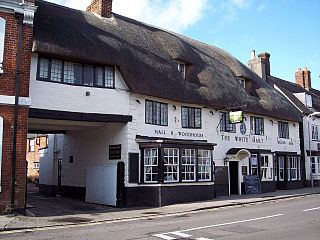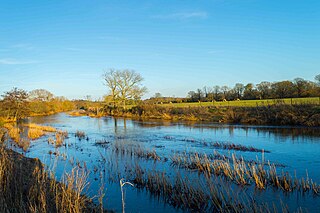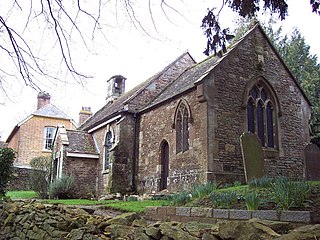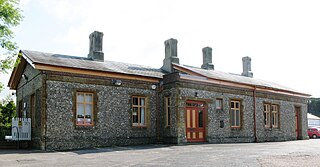




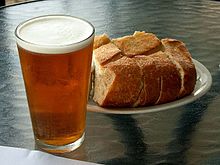







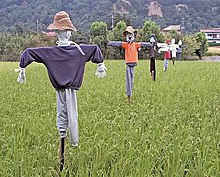













These are some words which are unique to the Dorset dialect , spoken in Dorset in the West Country of England.
Contents
| Word | Meaning |
|---|---|
| A | |
| A-cothed | Disease |
| A-drawen | Drawing, for example "He be a-drawen a picture." |
| A-feard | Afraid (Dorset motto, "Who's a-feard?") |
| Agean | Against, for example "'e be runnin' agean thac strong wind." |
| Aggy | The act of collecting eggs [1] |
| Aïght | Eight |
| Ailen | illness, ailing (verb or noun) [1] |
| Air vlees | Flies that seldom land for hovering in the air |
| Aish or Aishy | Ash tree |
| Aish-a-twiddick | Ash twig |
| A-lassen | Lest |
| Alik' | Like |
| All's | All this |
| Amper | Pustules "I be all out in an amper!" |
| Aller | The alder tree |
| Allum | All of them |
| Anby | At a near time, by and by |
| Annan? | An interjectional exclamation. "What did you say?" |
| Anewst, or Aniste | At nearest |
| Anigh | Near, close by [1] |
| Ankly | The ankle [1] |
| Any-when | At any time [1] |
| Archet | Orchard [1] |
| Arn | A contraction of "e'er a one" |
| Ash candles | The seed vessels of the ash tree |
| Asker | Water newt |
| A-strout | Stretched out [1] |
| A-stooded | Stood (as a waggon) immovably in the ground |
| A-stoggd | Having your feet stuck in either clay or dirt |
| At | To play at, to have at |
| Athirt | Across |
| Auverlook | Overlook, bewitch, look on with the evil eye |
| Avore | Before [1] |
| A-vroze | Frozen [1] |
| Awaked | Awake |
| Ax | To ask [1] |
| Axen | Ashes [1] |
| Ayer | Air [1] |
| A-zet | Set or planted |
| A-zew | 1) To be dry of milk; no longer giving suck "The cow's a-zew" 2) To sew a pond, to drain or draw it dry. |
| B | |
| Backhouse | Outhouse [1] |
| Backside | backyard or rear of property [1] |
| Bad | Synonym for ill |
| B'aint | be not |
| Ballyrag | To scold [1] |
| Bandon | Abandonment |
| Bandy | A stick used for beating dung out of the way, usually long and sturdy with a bent end [1] |
| Bandylags | Crooked/bowed legs |
| Bankrout | Bankrupt |
| Bantling | Child |
| Barken | Barley [2] |
| Barry | Borrow [2] |
| Batch | Hillock [2] |
| Battenbuoard | A tool for tamping thatch on a roof [2] |
| Baven | A faggot of untrimmed branches [2] |
| Beas' | Beast, usually refers to cattle [2] |
| Beatplough | A tool used for cutting turf [2] |
| Becall | To deride |
| Bedraggled angels | Wet sheep |
| Beens | Because, possible contraction of 'being as' [2] |
| Bee-pot | Beehive [2] |
| Beknown | Known about |
| Bennits | The bent tips of grasses and similar [2] |
| Ben't | Wasn't |
| Bibber | Shiver with cold [2] |
| Bide | Dwell [2] |
| Biddle | Beetle [2] |
| Bird-kippy | To keep birds from the corn [2] |
| Bissen | Bist not, Art not |
| Bit-an'-drap | A bite to eat and a drink [2] |
| Bit-an'-crimp | Every last scrap of something [2] |
| Biver | To shake or quiver with cold or fear |
| Black Bards | Rooks (or 'storytellers') |
| Black-bob | Cockroach |
| Blatch | Black or sooty [2] |
| Blather | An uproar [2] |
| Bleare | To cry outload and fretful like a child |
| Blether | To bleat or blare much; to talk noisily |
| Blood beads | Berries |
| Bloody Warriors | Wallflowers |
| Blooth | Blossom [2] |
| Bottom | Steadfast [2] |
| Braims | Membranes |
| Brake | A thicket |
| Brembles | Brambles |
| Brinton or Braton | Bold, audacious [3] |
| Brockle | Broken [3] |
| Bruckly or Brickley | Brittle [3] |
| Brushen | Huge/giant |
| Budget | A leather pouch for a whetstone [3] |
| Bull-head | Tadpole |
| Bumbye | By-and-by [3] |
| Bundle | To bound quickly |
| Bunker | Rabbit |
| Button-crawler | Woodlouse |
| Bwoneyard | Graveyard/churchyard |
| C | |
| Caddie | An uproar or carry-on [3] |
| Caddle | Muddle [3] |
| Cag | Cloy/clog |
| Cag-mag | Rotten meat |
| Cammish | Awkward |
| Car | Carry or move: to car hay is to stack hay [3] |
| Carner | Corner |
| Cas'n | Can'st not |
| Cast | Prematurely born |
| Cazelty weather | Extremely bad weather (casualty weather) [3] |
| Chalky | Ghostly |
| Chammer | Chamber, bedroom, room |
| Charken, charked | Burn (to charcoal), burned |
| Chattermag | Magpie |
| Chawly-whist | Ashamed |
| Chaw | Chew [3] |
| Cheese-late | A floor for drying cheese [3] |
| Chetlens | The entrails of any edible animal |
| Chilver or Chilver hog | A yearling ewe lamb |
| Chimley | Chimney [3] |
| Chop | Sell, barter or exchange [3] |
| Chump | A log of wood [3] |
| Clavy | Mantelpiece [3] |
| Clinker | Icicle [4] |
| Clitty | Stringy and sticky, tangled in clods or lumps |
| Clodgy | Dumplike, close |
| Clot | Lump, clod |
| Clutchéd | Clutched |
| Cockle | Tangle [4] |
| Codgloves | Hedger's gloves, with a bad for all the fingers together |
| Comely or Come | To be ripe. Inviting |
| Conk-load | Nose-full |
| Conzum-ed | Consumed |
| Cowheart | Coward |
| Cowlease | An uncut field, meadow [4] |
| Cradlehood | Early stages of childhood, infancy, still in the cradle [4] |
| Crate | Womb |
| Creezey | Silky |
| Crewel | Cowslip |
| Cricket | A low stool or chair for a child [4] |
| Crims | Cold-shivers, creeping of flesh |
| Croodle | To rock, to coo. To make little crowings |
| Croopy | To sink one's body, bending down the thighs behind the legs |
| Crousty | Grumpy, in a bad mood [4] |
| Culver | Wood pigeon |
| Curdles | Hair curls [4] |
| Cuty | Wren |
| D | |
| Dabster | Someone who is skilled in something, an expert [4] |
| Dadder | To confuse or bewilder [4] |
| Dander | Vex, anger [4] |
| Darkling bird | Blackbird |
| Daw | Jackdaw |
| Death-biddle | Deathwatch beetle |
| De-da | Simple, foolish, slow-witted |
| Devil's bird | Magpie |
| Dewbit | A bite to eat taken first thing in the morning before breakfast [4] |
| Didden | Did not |
| Dorring | Mocking |
| Doughbiaked | Feeble-minded [5] |
| Dout | Put out a flame or fire, "Dout the candle" for example [5] |
| Downdashious | Audacious [5] |
| Drashel | The strip of wood or concrete at the bottom of a doorway, the threshold [5] |
| Draty | Draught, draughty, full of draughts of air |
| Drawlatcheten | Idle, lazy [5] |
| Drinky | Having consumed too much alcohol, inebriated [5] |
| Dread-fulled | Full of dread |
| Dread gates | School gates |
| Drean | To drawl in speaking |
| Dree | Three |
| Drisk | A fine, wind-driven mist |
| Drownsy | Drowned |
| Drush | Thrush |
| Duckish | Dark, gloomy [5] |
| Drong | Squeeze or compress [5] |
| Drongway | A narrow passage or alley; Most commonly a narrow footpath between two fenced fields [5] |
| Dumbledore | Bumblebee [5] |
| Dummet | Dusk |
| Dungy | Downcast, dull |
| Dunnick | Sparrow |
| E | |
| 'e | He |
| Eacor | Acorn |
| Eet | Yet [5] |
| Effets | Newts [5] |
| Egg-tree | Ovary |
| Elebm | Eleven |
| Em | Them |
| Emmets | Ants [5] |
| En | Him |
| Engripement | Grievance |
| 'enself | Himself |
| 'es | His |
| 'e's | He is |
| Eth, ethly | Earth, earthly |
| Ethed | Buried |
| Ether-hunger | The hunger for earth, sometimes felt by persons approaching death |
| Evemen | Evening [5] |
| F | |
| Faddle | To pack or bundle together [6] |
| Fantod | Fuss [6] |
| Farterous | Father-like |
| Feasen | Faces |
| Fess | Pleased with, proud [6] |
| Fevrell | February |
| Fleeceful | As much as fills a fleece |
| Fleecy | Fleece; drunk, drunken |
| Flummocks | To scare or frighten [6] |
| Footling | Something worthless, beneath contempt [6] |
| Footy | Insignificant, small, trivial [6] |
| Fowel | The placenta of a cow |
| Freen | Free from |
| Frith | Thin twigs that have broken off from trees and bushes, historically used to make brushes; brushwood [6] |
| Frog-hopper | Grasshopper |
| Furby | Foul or sticky matter, as that on a tongue in sickness |
| G | |
| Gake | To stare open-mouthed, gawk, gape [6] |
| Gallycrow | Scarecrow [6] |
| Gannywedge | A wide yawn or to spread apart [6] |
| Gap | Mouth |
| Gapmouth | Nightjar |
| Gawl, Gawly | An opening, an empty place, a bare patch; empty hollow |
| Gi'e | To give, to yield |
| Gilcup or Giltcup | A small, yellow flower of the family Ranunculaceae, common in meadows and pasture; buttercup [6] |
| Girding | Taunting |
| Girt | Large, great [6] |
| Glene | To joke with [7] |
| Glory hole | Vagina |
| Glow | Stare or watch with fixed, open eyes |
| Glutch | To swallow [7] |
| Gnang | To mock by half-clear sounds, wagging the jaw with a grin |
| God's stinking tree | Elder |
| Goocoo | Cuckoo |
| Goocoo pint | Wild arum, snakeshead, Arum maculatum |
| Goocoo's bread | Wood sorrel |
| Goocoo spettle or Spume | Cuckoo spit, a white froth secreted by insects |
| Grab | Crab apple tree |
| Gramf'er | Grandfather |
| Gramm'er | Grandmother |
| Grave | To bury |
| Greygole | A small, blue woodland flower of the hyacinth family; Bluebell [7] |
| Gribble | A young crab tree or blackthorm |
| Grotten | A sleep-slade, a run or pasture for sheep |
| Growed | Grew |
| Gurrel | Girl |
| Gwain | Going [7] |
| Gwains-on | Rowdy behaviour (goings-on) [7] |
| H | |
| Hag-ridden | A nightmare attributed to a supernatural presence of a witch or hag, by whom one is ridden to sleep |
| Halterpath | A path for a horse and rider; Bridleway [7] |
| Handy | Thereabouts, an approximation, "Ees 6' or somewhere 'andy" for example [7] |
| Hangen house | A shed under the continuation of the roof of the house |
| Han'pat | Nearby, close at hand [7] |
| Harled | Tangled |
| Hassen | Hast not |
| Hatch | A small gate [7] |
| Heabm | Heaven |
| Heal or Healéd | To cover over [7] |
| Hedlen | Headlong [7] |
| Heissen | A prediction of evil |
| Hetful | Hot |
| Heth | Hearth |
| Hethcropper | A horse or pony bred on a heath [7] |
| Hidy-buck | Children's game, hide-n-seek [7] |
| Ho | To be anxious or to show caution [8] |
| Hoar-stone | Standing stone or ancient boundary stone |
| Hobble | A field-shed for cattle |
| Hobby Horse | Woodlouse [8] |
| Hogget | A yearling sheep of either sex, the meat of a hogget |
| Hogget shears | Sheep shears |
| Hold wi' | Side with |
| Holm | Holly |
| Holrod | Cowslip |
| Holway | Hollow lane |
| Homhle | A duck [8] |
| Honey-zuck | A climbing plant of the family Caprifoliaceae; honeysuckle [8] |
| Honking | Inhale deeply |
| Hook | To gore with the horns |
| Hoss-stinger or Ho's adder | Dragonfly [8] |
| Hummock | Cow |
| Hustle | To moan, spoken of the wind |
| Hwome | Home |
| I | |
| Ice-candles | Icicles [8] |
| Inneath | Behind, inside |
| Inon | Onion [8] |
| Inwards | Innards |
| J | |
| Joppety-joppety | Anxious, nervous trepidation [8] |
| K | |
| Keech | To clear a riverbank of weeds [8] |
| Kit | Friend or family, kin [8] |
| Knog | Knob |
| L | |
| Lag | Leg |
| Lagwood | The larger cut-off branches and twigs of a tree |
| Laminger | One who has become lame |
| Lamploo | A game of tag in which those caught join hands with the pursuer/s to form a chain [9] [10] |
| Lear | An ailing in sheep |
| Leaze | Field |
| Leery | Hungry [9] |
| Lerret | A traditional, double-ended boat with a flat bottom and high sternposts, which can be launched from a steep bank or beach [9] [11] |
| Let | A stopping or interruption |
| Limber | Skinny, slim, slender [9] |
| Limner | Painter and decorator [9] |
| Lip | Basket [9] |
| Lippen | Wet weather, rainy, sometimes also referred to as lippy [9] |
| Lisome | Cheery, happy [9] |
| Litter | Confusion [9] |
| Litty | Of light and easy bodily motion |
| Loneleft | Left alone |
| Long tail | Pheasant |
| Lovesome | Lovely, loving |
| Lowsen | To listen |
| Lure | A disease of sheep; an ulcer in the cleft of the foot |
| Lwonesomness | Lonesomeness |
| M | |
| Magot | An impulse or whim [9] |
| Maggoty | Very drunk |
| Main | Strength, power [9] |
| Mampus | A crowd [9] |
| Mandy | Saucy |
| Mare's tail | Equisetum arvense (horsetail) |
| Mazzerdy | Knotty |
| Meeces | Mice |
| Mesh | Moss [9] |
| Midin' | Might not, may not |
| Milchi | Milk, milky pale |
| Milk flower | Snowdrop |
| Mingdom | A stinking, dirty or unpleasant kingdom |
| Mommet | A guy, an effigy |
| Moud or Moule | Field mouse [12] |
| Mus'n | Must not |
| Mwope | Bullfinch |
| N | |
| Nammet | A light lunch of meat [12] |
| Near | Parsimonious, miserly [12] |
| Nearen | Nearby |
| Nesh, Neshen | Tender |
| Nesseltripe | The weakest or last born |
| Nether-ethed | Buried |
| Netherwise | Viewed from below |
| Nicky | Kindling [12] |
| Nippy | Peckish [12] |
| Nirrup | Donkey [12] |
| No-but | Nothing but |
| Noowhen | At no time |
| Not | Flowerbed [12] |
| Nuncheon | A noon-time meal, luncheon [12] |
| Nuts | Joy; testicles |
| O | |
| Oone | One |
| Orf | A viral form of pustular dermatitis found in sheep, and communicable to humans |
| Out ov ban | Instantly, at once [12] |
| Over-right | Opposite [12] |
| Over-watch | Baby-sit |
| Owl, owling | To owl about, to ramble by night |
| P | |
| Pank | To pant |
| Parlour-sky | Attic, loft |
| Parrick | A piece of fenced off land, a paddock [12] |
| Peart | Healthy, vibrant, full of life [13] |
| Pecker | Green woodpecker |
| Peck upon | Dominate [13] |
| Pelt | A rage, to feel angry [13] |
| Peze, peaze | To ooze out |
| Piaviours | Flagstones [13] |
| Piggyback, a pig a back, a pack a back | To carry a child on one's back with their arms around your neck and their legs around your waist. |
| Piss-a-bed | Dandelion |
| Pisty poll | To carry a child on one's shoulders with their legs around your neck and their arms around your forehead. |
| Pleck | A small enclosure |
| 'plexion | Complexion |
| Pock-fretten | Pock-marked from acne |
| Poll | Head |
| Popples | Pebbles [13] |
| Prog | Food [13] |
| Purl | Curl, swirl, frill; or an abbreviation of pur lamb |
| Pur lamb | A castrated ram lamb |
| Puxy | A miry or boggy place |
| Pwope | A bunchy thing, an effigy, a doll, a puppet |
| Q | |
| Quartere'il, Quaterevil | A disease of sheep, a corruption of the blood |
| Quine | The corner of a wall [13] |
| Quob | Quiver, shake [13] |
| R | |
| Rafty | Rancid |
| Rake | To reek |
| Rale | Walk [13] |
| Rammish | Strong smelling, rank |
| Ramshacklum | Useless [13] |
| Rangle | To reach about like a trailing or climbing plant |
| Rap | Swap, barter or exchange [13] |
| Rathe | Early [13] |
| Reames | The frame or ligaments of a thing, skeleton |
| Rean | Consume food quickly and greedily [14] |
| Reaphook | A curved blade for cutting grasses; Sickle [14] |
| Reapy | Reap |
| Red-bread | Vagina |
| Reddick | Small garden bird with a red breast, commonly known as a robin (Erithacus rubecula) [14] |
| Red rag | Tongue |
| Reeve | Unravel [14] |
| Riblets | Little ribs |
| Roasting tomb | Stove |
| Rod | Penis |
| Rottletrap | Rickety [14] |
| Ruddle | A red earth by which they mark they mark sheep |
| Rudger or Rig | An uncastrated horse |
| Rum | Queer |
| Rumstick | Queer, a queer man |
| S | |
| Sar | To serve or feed animals |
| Sarch | To search |
| Satepoll | A foolish or silly person [14] |
| Scaly | Mean, stingy [14] |
| Sclerevil | Hardened and evil |
| Scote | To shoot along very fast |
| Scram | Screwy-grown |
| Scratch, scratching | To write, writing; to carve |
| Screak, screaking | To creak loudly |
| Scriddick, scrid | A small scrap or shred |
| Scrip | Shepherd's coat |
| Scroff | Small bits of dead wood |
| Scroop, scrooping | The low sound of one hard body scraping against another |
| Scrounch, Scrunch | To crunch strongly |
| Seem an I | Seems to me |
| Shabby mothers | Ewes |
| Shade | Spirit, ghost |
| Shatten | Shall not |
| Sheep nuts | Coarse mix pellets, sheep food |
| Shim | a she/him |
| Shockle | To shake about lightly |
| Shoo | A cry to fray away owls |
| Shram | A screwing up or out of the body and limbs from keen cold |
| Sify | To catch the breath in sighing; to sob |
| Sives | Chives or garlic [14] [15] |
| Skeat, skeating | A looseness of the bowels |
| Sloey spears | The sharp spines on the branches of the sloe or blackthorn |
| Slommock(en) | A slatternly, thick-set, stocky, short, dirty woman |
| Smame | To smear |
| Smeech | A cloud of dust [16] |
| Smirchéd | Tarnished |
| Smoor | To smear |
| Snabble | To snap up quickly; To eat quickly or greedily [16] |
| Snake's-head | Arum maculatum |
| So't | Soft |
| Soldier's tears | Mullein, a tall, stiff flowered, woolly plant |
| Somen | Someone |
| Somewhen | At some time |
| Soonere | Ghost |
| Span-new | Clean and shiny, like new [16] |
| Spawl, spawly | A splinter flown off, as from wood or stone; splintered |
| Sprak | Spry, lively [16] |
| Speare | Thin, lanky |
| Spet | To spit |
| Spiles | The beard of barley |
| Spotter | (Great or lesser) Spotted Woodpecker |
| Spume | Come, semen |
| Squitters | Diarrhoea in cattle |
| Stare | Starling |
| Stiver | To stiffen up much as an angry dogs hairs |
| Stumpy | To walk with short stamoing steps |
| Sweethearts | Goose grass |
| Sweven | A dream |
| T | |
| Taffle | To tangle, as grass or corn beaten down by weather |
| Tarble | Tolerable |
| Tardle | To tangle |
| Teake to | To reach forth to a man or thing with a ready good will |
| Teare | Eager and bold as flies on food |
| Tet | Teat |
| Tewly | Small and weakly |
| Theave | A three-year-old sheep |
| Theosom | These |
| Thick as inkle weavers | Close in friendship, from inkle, a kind of tape for a very narrow loom at which the weavers sat close side by side |
| Thieves | Fairies |
| Thik | That |
| Thirtover | Perverse |
| Thumbles | Thumbs |
| Tidd'n | 'tis not |
| Tilty | Grumpy, irritable, ill-tempered [16] |
| Tinklebobs | Icicles [16] |
| Torrididdle | A state of bewilderment or confusion [16] |
| Toyear | This year; as in today, tomorrow etc. [16] |
| Trapes, Trapesèn | A woman who tramps about bodly |
| Tree-tears | Leaves |
| Tuen | Tune |
| Tup | A ram; (of a ram) to copulate with a ewe |
| Twanketen | Sad, melancholic [16] |
| T'wards | Towards |
| 'twere | It were |
| Twiddick | A small twig |
| Twink | Chaffinch |
| Twoad | Toad |
| Twoad's meat | Toadstools |
| U | |
| Undercreepen | Devious, sly, underhand [17] |
| Unheal | To uncover |
| Unray | To undress |
| Upsmitten | Dust or liquid sprayed or blown upawrds |
| Upsydown | Upside down, overturned [17] |
| V | |
| Vall | To fall |
| Vang | To earn [17] |
| Veag | Wrath, a high heat of anger (Anglo-Saxon faegth) |
| Veäre | Weasel |
| Veäry | Fairy |
| Veäry ring | Fairy ring, a ring of fungi |
| Veäry tale | Fairy tale |
| Vess'y | To versey, to read verses by turns |
| Vilthy | Filthy |
| Vinny | Veiny or mouldy, like the Dorset cheese, Blue-vinny [17] |
| Vitty | Neat and proper [17] |
| Vive | Five |
| Vlee | Fly |
| Vlesh vlee | A blowfly, a flesh fly |
| Vlit | Flit |
| Vlittermouse | Bat |
| Vloat | Float |
| Vlutterbie | Butterfly |
| Vog | Fog |
| Vokket | To go about here and there |
| Voley | Vole |
| Vom | Vomit |
| Vorehearing | Premonition, forewarning |
| Vore-right | Going forward without regard to consequences or seemliness |
| Voretold | Foretold |
| Vorewarn | Forewarned |
| Voul | Foul |
| Vower, vowr, vow'r | Four |
| Vuzzen | Fir trees |
| W | |
| Wagwanton | Quaking grass |
| Want | Mole |
| Want-heave | Mole hill |
| Want-heave slave | A mole |
| Ware | Pond [17] |
| Waxen crundels | Swollen tonsils |
| Weave | To rock backwards and forwards in pain |
| Welshnut | Walnut [17] |
| Werret | To concern or worry [18] |
| Wether | A castrated male lamb |
| Wevvet | Cobweb |
| Wevvet queens | Spiders |
| Wheel-bird | Nightjar |
| Whinnick | To whine softly or slightly |
| Whiver | To hover, to quiver |
| Winker | Eyeball |
| Woak | Oak |
| Woodculver | Wood pigeon or ringdove |
| Woone | One |
| Wont | Mole, small burrowing mammal of the family Talpidae [18] |
| Woppen | Big, heavy [18] |
| Wopsy or Wops | Wasp [18] |
| Wordle | World [18] |
| Wurse | Devil, arch-fiend |
| Y | |
| Yakker | Acorn [18] |
| Yer | Your |
| Yer tiz | Here it is, yes it is |
| Yis | Earthworm [18] |
| Yoller | Yellow |
| Yollerheads | Daffodils |
| Yoller roses | Primroses |
| Yop | Speak rapidly, jabber [18] |
| Z | |
| Zeale or Zack | Sack [18] |
| Zebm | Seven |
| Zedgemocks | Tufts of sedge grass |
| Zet up | To anger, infuriate [18] |
| Zing | Sing |
| Zive | Scythe |
| Zix | Six |
| Zounds | Sounds |
| Zummat | Something [18] |
| Zwail | Swagger [18] |
| Zweal | To scorch |
| Zweat | Sweat |
| Zween, zweemy | A feeling of swinging around in the head |




